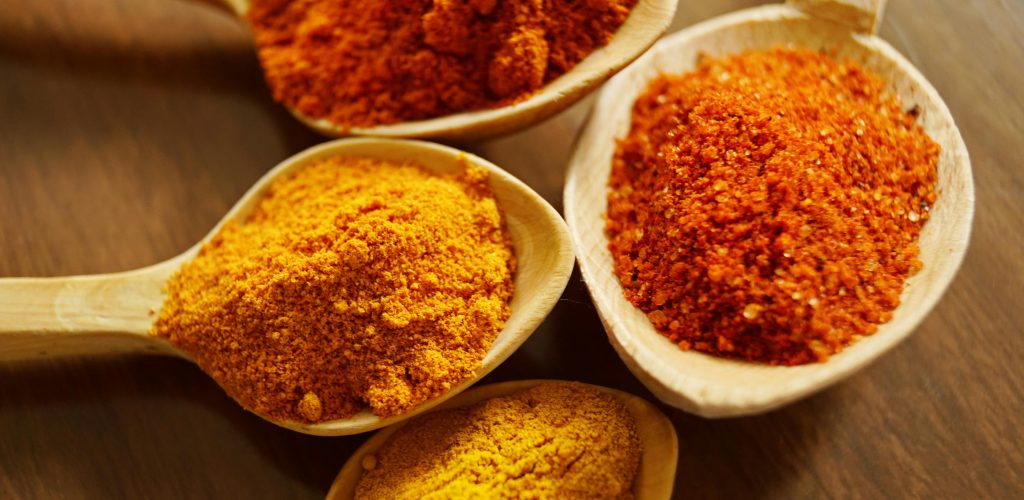- July 30, 2024
- 12:02 PM

Introducing spices to your baby food can enhance their taste preferences and provide various health benefits. Here’s a step-by-step guide to help you safely incorporate traditional Indian spices into your baby’s diet.
Tips for Introducing Spices for Babies
- Start Slowly: Introduce one spice at a time and observe for any allergic reactions.
- Mix with Familiar Foods: Mix new spices with foods your baby already enjoys.
- Consistency: Use ground spices or make a fine paste to avoid choking hazards.
- Watch for Reactions: Always watch for any signs of allergy or intolerance.
When to Start Spices for Babies?
You can typically introduce mild spices to babies when they start solid foods, around 6 months of age, following the principles of baby-led weaning or traditional weaning. However, it’s important to go slow and introduce one spice at a time to ensure the baby doesn’t have any allergic reactions or digestive issues. Here’s an expert guideline:
Starting Spices for Babies:
Age 6-8 Months
Spice: Turmeric (Haldi)
• Quantity: A pinch
• Benefits: Anti-inflammatory and antioxidant properties.
• Recipe Suggestion: Add a pinch of turmeric to pureed vegetables like carrots or sweet potatoes.
Spice: Cumin (Jeera)
• Quantity: A pinch
• Benefits: Aids digestion.
• Recipe Suggestion: Add a pinch of cumin powder to mashed lentils (dal) or vegetables.
Age 8-10 Months
Spice: Coriander (Dhaniya)
• Quantity: A pinch
• Benefits: Anti-inflammatory and helps in digestion.
• Recipe Suggestion: Sprinkle a pinch of coriander powder into soups or purees.
Spice: Fennel (Saunf)
• Quantity: A pinch
• Benefits: Helps with digestion and reduces colic.
• Recipe Suggestion: Add a pinch of fennel powder to apple puree or rice pudding.
Age 10-12 Months
Spice: Ginger (Adrak)
• Quantity: A pinch
• Benefits: Helps with digestion and reduces nausea.
• Recipe Suggestion: Add a pinch of grated ginger to vegetable soups or lentil dishes.
Spice: Cardamom (Elaichi)
• Quantity: A pinch
• Benefits: Helps in digestion and has a soothing effect.
• Recipe Suggestion: Add a pinch of cardamom powder to porridge or mashed bananas.
Spice: Black Pepper (Kali Mirch)
• Quantity: A tiny pinch
• Benefits: Improves digestion and has antioxidant properties.
• Recipe Suggestion: Sprinkle a tiny pinch of black pepper on scrambled eggs or vegetable soups.
Spice: Garlic (Lahsun)
• Quantity: A tiny pinch
• Benefits: Boosts immunity and has antibacterial properties.
• Recipe Suggestion: Add a tiny pinch of crushed garlic to lentil soups or vegetable dishes.
Age 12 Months and Above
Spice: Cinnamon (Dalchini)
• Quantity: A pinch
• Benefits: Regulates blood sugar levels and has anti-inflammatory properties.
• Recipe Suggestion: Sprinkle a pinch of cinnamon on oatmeal or yogurt.
Spice: Cloves (Laung)
• Quantity: A small pinch
• Benefits: Antibacterial and aids digestion.
• Recipe Suggestion: Add a small pinch of clove powder to soups or stews.
Spice: Nutmeg (Jaiphal)
• Quantity: A small pinch
• Benefits: Helps with sleep and digestion.
• Recipe Suggestion: Add a small pinch of nutmeg to mashed sweet potatoes or milk.
Spice: Mustard Seeds (Rai)
• Quantity: A small pinch
• Benefits: Good source of vitamins and minerals.
• Recipe Suggestion: Temper a small pinch of mustard seeds in oil and add to cooked vegetables or dal.
Spice: Red Chili Powder (Lal Mirch)
• Quantity: A tiny pinch
• Benefits: Boosts metabolism.
• Recipe Suggestion: Add a tiny pinch of red chili powder to lentil soups or vegetable curries.
Spice: Garam Masala
• Quantity: A small pinch
• Benefits: Enhances flavor and adds warmth.
• Recipe Suggestion: Add a small pinch of garam masala to chole or rajma for a flavorful meal.
Spice: Sambar Masala
• Quantity: A small pinch
• Benefits: Rich in various spices, provides complex flavor.
• Recipe Suggestion: Add a small pinch of sambar masala to lentil soups or vegetable stews.
Spice: Amchoor Powder
• Quantity: A small pinch
• Benefits: Adds tanginess and is rich in vitamins.
• Recipe Suggestion: Sprinkle a small pinch of amchoor powder on cooked vegetables or salads.
Introducing spices to baby food adds flavor and health benefits. Start slowly, introduce one spice at a time, and mix with familiar foods. By observing reactions and using small amounts, you can safely enhance your baby’s taste preferences, making meals both nutritious and enjoyable.
Know your guide

Hello, amazing parents! I’m Riddhi Verma Ayyagari, a Stanford-certified Child Nutritionist and Baby-Led Weaning Expert. With years of experience and a proven approach, I’ve helped 8000+ of families navigate child nutrition, from starting solids to tackling picky eating.
Make mealtimes easier and more enjoyable with personalized 1:1 Sessions and my expert-led MasterClass. Start your journey to stress-free feeding today!
